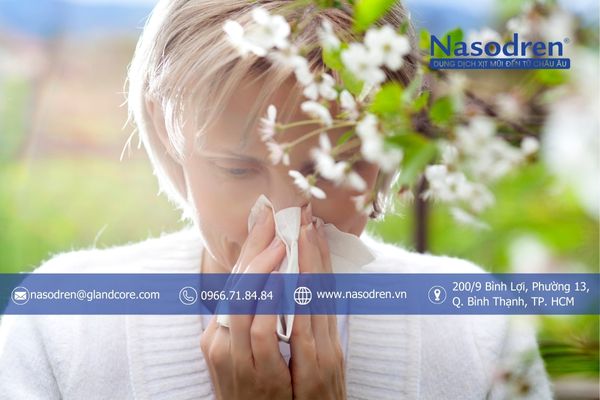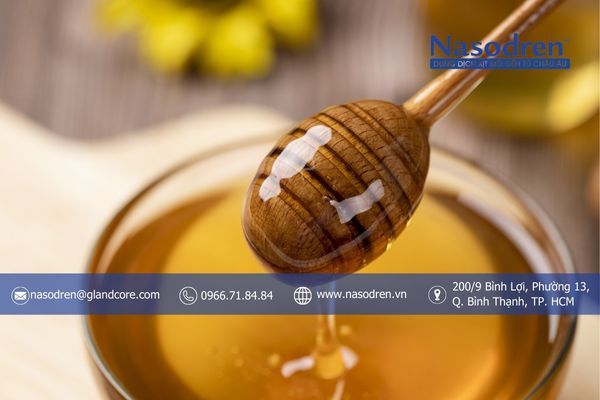News
TIPS TO TREAT ALLERGIC SINUSITIS AT HOME
Tips for treating seasonal allergic rhinitis at home are an important part of alleviating headaches, discomfort and difficulty breathing that sinusitis often causes. In the context of climate and environmental changes, finding natural and effective methods to alleviate symptoms becomes extremely necessary. From simple measures such as changing lifestyle to applying natural therapies such as using natural ingredients, all can help improve health and relieve unwanted symptoms of seasonal allergic rhinitis. The following article Nasodren will show you some tips for treating seasonal allergic rhinitis at home.

Free consultation and order Nasodren nasal spray via hotline: 0966 718 484
CONCEPT OF WEATHER-ALLERGIC SINUSITIS
What is weather-allergic rhinitis?
Weather-allergic rhinitis is a condition of rhinitis caused by the immune system’s reaction to allergens in the environment, often due to changes in weather such as changes in climate and surrounding environment. Common symptoms of weather-allergic rhinitis include runny nose, itchy nose, sneezing, red and swollen nose.
What is weather-allergic rhinitis?
Weather-allergic rhinitis is an inflammation of the air sacs located around the nose and in the sinus area. This is one of the common types of sinusitis, which often occurs when the body overreacts to allergens in the environment, especially due to changes in the weather.
CAUSES OF ALLERGIC SINUSITIS

Seasonal allergic rhinitis is often caused by the immune system’s response to allergens in the environment. Causes of seasonal allergic rhinitis may include:
Pollen: This is a common cause, especially in the spring when plants are in bloom and release pollen.
Airborne dust and particles: Dust, particles, and irritants can irritate the lining of the nose, causing inflammation and allergic reactions.
Mold: Mold can grow in moist environments, and exposure to them can cause allergies in some people.
Weather changes: Changes in temperature, humidity, and air pressure can also irritate the lining of the nose, causing symptoms of rhinitis.
Air pollution: Smoke, chemicals, and dust particles can irritate the lining of the nose, causing inflammation and allergic reactions.
Exposure to other allergens: Chemicals in the environment such as cleaning chemicals and disinfectants can also cause allergies.
SIGNS OF ALLERGIC RHINITIS
There are some common signs that someone has allergic rhinitis due to changes in the weather. Some of these signs may include:
Runny nose: A constantly runny nose or clear nasal discharge.
Itchy nose: An itchy, irritated feeling in the nose.
Constant sneezing: Sneezing a lot, especially after exposure to an allergen.
Swelling and redness of the nose: The lining of the nose may swell and become red or irritated.
Discomfort and discomfort in the nose: A feeling of stuffiness, difficulty breathing, or discomfort due to nasal congestion.
Accompanied noise or the sound of a person inhaling strongly when breathing through the nose: This may be a sign of trying to open the air outlet through the blocked nose.
SOME EFFECTIVE HOME TIPS FOR TREATING WEATHER-RELATED ALLERGIC SINUSITIS
Honey
Honey is a natural ingredient with many health benefits, including antibacterial, anti-inflammatory, cough-relieving, pain-relieving effects, etc. Using honey to treat weather-related allergic rhinitis is also a method applied by many people.
How to do it:
Mix 1-2 teaspoons of honey with warm water. Drink 3-4 times/day.
Mix honey with lemon juice and drink.
Drop a few drops of honey into the nasal discharge.

Onions
Onions contain quercetin, a compound that has been shown to reduce inflammation and allergies. Eating raw onions or adding them to your daily diet may help reduce symptoms of allergic rhinitis.

Betel leaves
Betel leaves also contain quercetin and have the ability to reduce inflammation and allergies. You can make tea from betel leaves and enjoy it every day to help relieve symptoms.
How to do it:
Boil water, add betel leaves and boil for another 5 minutes.
Use betel leaf water to rinse your nose or steam.

Fresh Ginger
Fresh ginger has anti-inflammatory and antibacterial properties. You can add fresh ginger to boiling water to make tea or use it in dishes to support overall health.
How to use:
Mix 1-2 teaspoons of ginger juice with warm water. Drink 3-4 times/day.
Drink ginger tea.

Turmeric
Turmeric contains curcumin, a powerful anti-inflammatory. You can use fresh turmeric to add to dishes or make drinks. However, it should be noted that the use of turmeric should be adjusted appropriately and consult your doctor if you are using other medications.

NOTES WHEN USING METHODS TO TREAT SINUSITIS AT HOME
Here are some notes when using methods to treat seasonal allergic rhinitis at home:
Tips to treat seasonal allergic rhinitis at home only have a supportive effect on treatment, and cannot replace medicine. If the symptoms of seasonal allergic rhinitis do not improve or become worse, you should see a doctor for timely diagnosis and treatment.
Before using any tips to treat seasonal allergic rhinitis, you should consult a doctor or medical professional to ensure safety and effectiveness. Some tips may cause side effects or interact with medications you are taking.
You need to follow the instructions correctly and in the recommended dosage to achieve the best results.
For children, pregnant or breastfeeding women, caution should be exercised when using tips to treat seasonal allergic rhinitis at home.
PREVENTION OF WEATHER-ALLERGIC SINUSITIS
To prevent weather-allergic rhinitis, you should take the following measures:
Avoid contact with allergens:
If you are allergic to pollen, limit going outdoors when there is a lot of pollen, especially in the early morning and late afternoon.
If you are allergic to dust, regularly clean your house, wash blankets, pillows, etc.
If you are allergic to animal hair, limit contact with pets.
Keep your house clean:
Regularly clean your house, especially surfaces that can accumulate dust and dirt such as tables, chairs, cabinets, etc.
Wash blankets, pillows, bed sheets, etc. at least once a week.
Use a vacuum cleaner to vacuum up dust in the house.

Strengthen the body’s resistance:
Eat a nutritious diet, especially foods rich in vitamin C, vitamin A, …
Exercise regularly.
Get enough sleep.
NASODREN PRODUCT CONTACT INFORMATION
Glandcore is a company specializing in distributing pharmaceutical ingredients (APIs), excipients, food ingredients, functional foods and high-quality cosmetics. In addition, Glandcore also provides technical solutions to customers & partners in the pharmaceutical industry
Nasodren® products are carefully selected by Glandcore for exclusive distribution in the Vietnamese market.
Customers can contact Nasodren through GLANDCORE COMPANY LIMITED BRANCH
Address: 200/9 Binh Loi, Ward 13, Binh Thanh District, City. HCM, Vietnam
Free product consultation and quotation hotline: 0966 718 484
Nasodren product fan page customer care: Nasodren – Breakthrough effectiveness in treating sinusitis
Website to access Nasodren nasal spray: https://nasodren.vn/
Zalo hotline about Nasodren nasal spray: 0966 718 484
Feel the difference in breathing with Nasodren®. Nasal spray is made from 100% natural extract of Cyclamen europaeum. Safe and effective in helping to reduce the symptoms of sinusitis.
